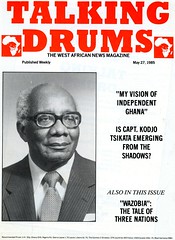Music And Arts Scene
African Records Review
By Kwabena Asamoah
HUGH MASEKELA: "Waiting For The Rain' (JIVE AFRIKA HIP 25) 'Lady' 'Politician' 'Tonight' 'The Joke Of Life'/'Run No More (A Vuo Mo)' 'Coal Train (Stimela)' 'Ritual Dancer' 'Zulu Wedding'.
In the present age of 'electronic' music it may not be surprising for even the 'golden hornsman of Africa' Hugh Masekela to go in for this type of music. He tried to go slightly Western with his 'Techno Bush' and successfully got away with it, but I dare say that 'Waiting For The Rain' borders on disappointment for listeners who are used to Hugh's style of music. Not only is his horn used rather sparingly, but also he tries to sacrifice his usually good South African rhythms in favour of Western funk as in 'Politician' and 'Run No More'.The greatest disappointment comes from Fela's 'Lady' which opens the A-side. This average track could have been saved by Hugh's horn rather than by the Lynn drum. Or was this arrangement the work of Stewart Levine in the same manner that Bill Laswell disturbed Fela's music with his electronic gadgets? This 'Lady' can hardly contribute anything substantial to the wealth of music around.
Serious lyrics are however, not overlooked as Masekela on this new LP as you would find in 'Politician', 'Run No More' and 'Ritual Dancer'. Hugh is sometimes a politician in his music but even in the dialogue with Barney Rachabane (alto sax) he is outshone which is a bit disappointing.
There is hardly any new thing about 'Coal Train' which Hugh has already done on a previous album but 'Tonight' remains a beauty of a slowie with one of the best vocal harmonies around, apart from vocal dialogue between Tsepo Tshola and Anneline Malebo. This track reminds me of Letta Mbulu's 'Somebody Help Me'. Rachabane's searching alto sax bolsters the only outstanding horn solo by Hugh who gives the feel of Freddie Hubbard in 'The Joke Of Life'.
On the whole there is little wonder on this album but Barney Rachabane, the entire Kalahari group and of course Masekela's own name save this LP from total disappointment.
LOUIS DOGBE: 'Ha Ni Eya' (INTER MUSIC 30-875) 'Dzolee Ei Mi' 'Ha Ni Eya'/'Asenta' 'Agro'.
The one-man band of the 53-year-old blind Ghanaian multi-instrumentalist Louis Dogbe - is another contribution to the wealth of 'African music' around. Recorded in Switzerland and produced by Louis Dogbe himself, this record is the result of years of active research and training which Dogbe undertook even from his early years at the School for the Blind at Akropong Akwapim in Ghana. Now an English teacher in a sighted school in Switzerland, Dogbe first trained as a teacher of the blind, took a teaching diploma in music and later came out with an M.Sc. in Sociology and a qualification in the Teaching of English as a Foreign Language in England.Dogbe has dug into Ga and Ewe traditions of Ghana to produce a highly stimulating material the proceeds of which will go into a re- search project for the benefit of blind people.
When 'Dzolee Ei Mi' begins the A-side one realises that Dogbe has his ears to the ground even to the electronic sounds which seem to characterise our world of music today. A well- arranged tune, 'Dzolee Ei Mi' expresses sadness out of the disappearance of a loved one. The bamboo flute supported by the Lynn drum and the synthe- sizer reflects the mood of Dogbe's music which has authenticity.
The B-side is not particularly different in style, but 'Asenta' sounds slightly stronger in its urgency and dance appeal. The beginning would remind most people of how Nana Ampadu used to begin his songs in the 'Ebi Te Yie' era. The story behind this track should spell gloom but the music is far removed from this mood. 'Agro' continues this atmosphere of dancing and merry-making. Do you want to dance?
NEW LIFE GOSPEL BAND: ''Behye Me Ma' Me Ma' (PMA 002) 'Wo Betumi Aye' 'Wawie Nkunim Di' 'Onam Mframa Mu' 'Nyame Beye N'Adwuma' 'Iesu Beba'/'Tesu Ye Ohene' 'Obaa Gyidi Ni' 'Odasani'.
Gospel music has not died down in Ghana; it is rather becoming more and more popular with people with like mind. The spirit has continued and extended to London where fans are buying this new LP like hot cakes.Recorded at the Ambassador Studio in Kumasi, Ghana, 'Behye Me Ma' is the work of Kwame Owusu and the New Life Gospel Band who are the latest addition to the growing number of 'spiritual' groups in Ghana. What immediately strikes you about the recording is the drum beat - a certain feature which permeates almost all tracks recorded at the Ambassador Studio including Eric Agyemang's 'Wonko Menko?' and Nana Tuffuor's 'Yewo Asaase'.
'Behye Me Ma' strongly retains serious hi-life elements in its perspec- tive but does not lose its religious content both in lyrics and feel. The striking differences between the A and B-sides is the mood and tempo of hi- life used: the A-side has more urgency while the B-side exhibits some solemnity. The only weakness comes from the keyboard which is hardly audible.
The vocal blend of Adjoa Pinaman, Esther Acheampong and Yaw Owusu makes a whole lot of difference to these songs of hope put together under Amoateng's production.
The guitar works and the instrumental refrain of a portion of Dr Ephraim Amu's hen Ara Asaase Ni' colour the already satisfying 'Behye Me Ma' which begins the A-side.
